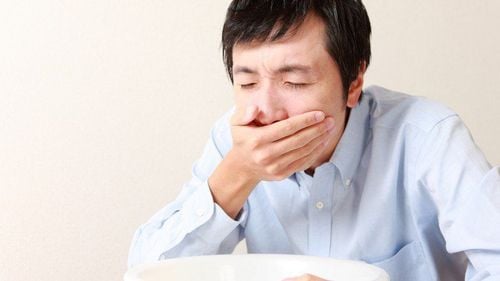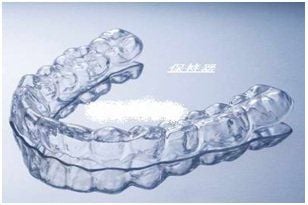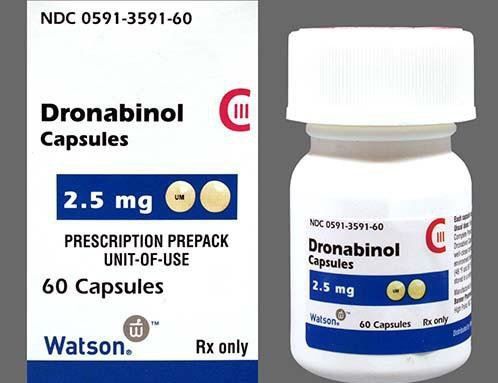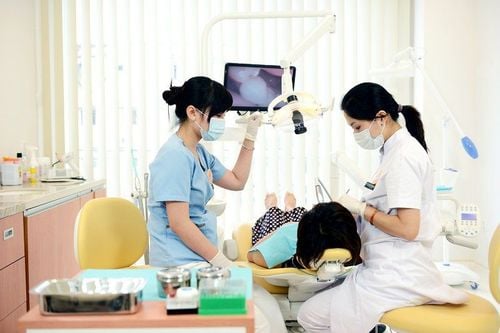This is an automatically translated article.
Teeth grinding is a common condition that occurs while sleeping, but can also happen while you are awake. If bruxism occurs frequently and with severity, it can lead to jaw disorders, headaches, damaged teeth and many other problems. So, how to stop grinding teeth day and night?
1. Features of bruxism
Teeth grinding often occurs while sleeping, so most people do not know that they are grinding their teeth. However, signs like a dull, constant headache or jaw pain when you wake up are notable symptoms to suggest bruxism.
If you suspect you may have this condition talk to your dentist. Your doctor will examine your teeth and jaw for signs of teeth grinding, such as jaw pain and excessive wear on your teeth.
1.1. Signs of bruxism Signs and symptoms of teeth grinding can include:
Teeth grinding loud enough to wake your sleeper Your teeth are broken, chipped or loose. Enamel wear. Toothache or pain. Jaw muscle fatigue or muscle spasms, the jaw is locked and cannot fully open or close. Jaw pain or soreness. The pain feels like an earache, although there is no problem with your ear. Dull headache from the temporal region. Damage to the inside of your cheek. Sleep disruption See your dentist if you have any of the symptoms listed above or have other concerns about your teeth or jaw. Doctors don't fully understand what causes teeth grinding, but it may be due to a combination of physical, psychological, and genetic factors.
Awake bruxism can be caused by emotions such as anxiety, stress, anger or frustration. Sleep bruxism can be a chewing activity related to stimulation during sleep. It is also more likely to be due to an abnormal bite or missing or crooked teeth. Teeth grinding can also be caused by a sleep disorder such as sleep apnea. 1.2. Factors that increase teeth grinding Factors that increase the risk of teeth grinding include:
Stress: Excessive stress or anxiety can lead to teeth grinding. Age: Teeth grinding is common in young children, and usually disappears in adulthood. Personality Type: People with aggressive, competitive, or hyperactive personalities may be at increased risk of teeth grinding. Drugs and other substances: An uncommon side effect of some psychiatric medications, such as some antidepressants, can cause teeth grinding. Smoking, drinking alcohol and caffeinated beverages, or using stimulants can increase your risk of bruxism. Your family members also suffer from bruxism. Teeth grinding during sleep tends to run in families. If you have bruxism, other members of your family may also have bruxism. Other disorders: Teeth grinding may be associated with a number of health disorders such as Parkinson's disease, dementia, gastroesophageal reflux disease, epilepsy, night terrors, and sleep-related disorders. sleep and attention deficit hyperactivity disorder (ADHD).
In some cases, chronic teeth grinding can lead to tooth fractures, loose teeth, or tooth loss. Chronic teeth grinding can cause tooth wear. When these situations occur, bridges, crowns, canals, implants, partial dentures, and even full dentures may be needed.
Severe teeth grinding not only damages teeth, losing teeth, but can also affect your jawbone, even change the appearance of your face. Therefore, there are ways to stop grinding teeth.
2. Ways to stop grinding teeth day and night
After the examination, depending on the cause of teeth grinding, the doctor may offer different treatment methods. Your dentist will advise you to choose the best solution to end this condition.
2.1. Patches and Splints The Mouthguard is a type of occlusal brace that is useful for sleep bruxism. This device will cushion your teeth and prevent them from grinding together while you sleep. Mouthguards can be custom-made at the dental clinic or purchased over the counter (OTC).
If you have chronic sleep grinding, specially designed mouthguards can help protect your teeth from damage. It can also loosen your jaw.
Mouthguards are made for each person, and come in a variety of thicknesses. They are specially fitted to your jaw size and shape. They are generally more comfortable than store-bought mouth guards because they are made of softer materials.
2.2. Braces Braces are a dental procedure that can be used to reshape or flatten the bite surface of teeth. This technique can be effective if your teeth grinding is caused by crowded, misaligned, or crooked teeth.
In some cases, a second procedure called blepharoplasty may be used to shape the tooth. Your dentist may perform one of two procedures.
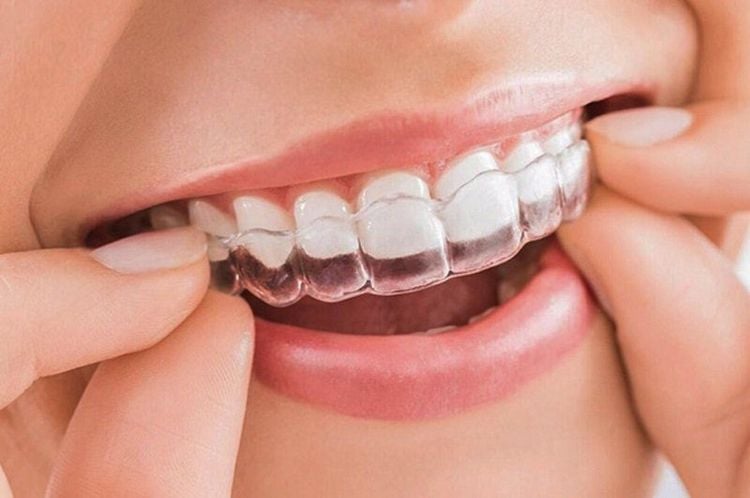
Cách để hết nghiến răng bạn có thể sử dụng phương pháp niềng răng
2.3. Botox In a meta-analysis of four studies, researchers found evidence that botulinum toxin (Botox) injections can reduce pain and reduce the frequency of teeth grinding in healthy participants.
However, researchers who conducted a study determined that more research is needed to confirm the safety and effectiveness of using Botox in the treatment of bruxism.
For this method, the doctor will inject a small amount of Botox directly into the bite muscle. This is a large muscle that moves your jaw. Botox won't cure bruxism, but it can help relax the bite muscle. Doing so may reduce bruxism and related headaches.
Each injection lasts for three to four months, after which you will need more injections to maintain the effect.
2.4. Biofeedback Biofeedback is a technique designed to help people perceive and eliminate a behavior. It can be used to reduce bruxism during sleep and wakefulness.
During biofeedback, your therapist will teach you how to control jaw muscle movement through visual, vibration, or auditory feedback generated by electromyography.
However, research on the effectiveness of biofeedback in the treatment of bruxism is limited.
2.5. Stress reduction techniques For some people, teeth grinding can be linked to mental health problems like stress, depression, and anxiety. If you are suffering from teeth grinding, stress reduction techniques can be helpful in some cases. Reducing stress also benefits your overall health, and it's a low-risk remedy.
Here are some stress reduction techniques you can apply:
Meditation: Meditation can help you reduce stress, anxiety, pain and depression. Try using a meditation app or join a meditation group. There are many different meditation methods, find out which one works best for you. Yoga: A small study of 20 participants reported a significant reduction in mild to moderate depression after yoga practice. Talk therapy: Talking to a therapist, counselor, or trusted friend can help reduce anxiety and stress. If your stress is affecting your daily life, your doctor may prescribe medication to help reduce stress and anxiety, if needed. Exercise: Exercise also reduces stress by producing endorphins that help you feel good. If you are new to exercise, start slowly.

Làm sao để hết nghiến răng thì bạn có thể tập thể dục để giúp giảm căng thằng
Open your mouth wide, while touching your tongue to your front teeth, doing this to help loosen your jaw. Say the letter "N" aloud, so your upper and lower teeth don't touch and help you avoid grinding your teeth. You can also try gently massaging your jaw to loosen up the muscles, which can help you stop or reduce your teeth grinding.
Other ways to stop grinding teeth include:
Limit your intake of foods and beverages that contain caffeine such as colas, chocolates and coffee. Limit alcohol intake. Do not bite the pen or bite anything that is not food. Avoid chewing gum as this allows your jaw muscles to get used to grinding and makes you more likely to grind. Train yourself not to grind. If you find yourself grinding your teeth while awake, place the tip of your tongue between your teeth. This will help your jaw muscles relax. Relax your jaw muscles at night by applying a warm washcloth to your cheek in front of your earlobe. Vinmec International General Hospital is one of the hospitals that not only ensures professional quality with a team of leading doctors, modern equipment and technology, but also stands out for its examination and consulting services. and comprehensive, professional medical treatment; civilized, polite, safe and sterile medical examination and treatment space.
Please dial HOTLINE for more information or register for an appointment HERE. Download MyVinmec app to make appointments faster and to manage your bookings easily.
Reference sources: webmd, healthline, mayo clinic





